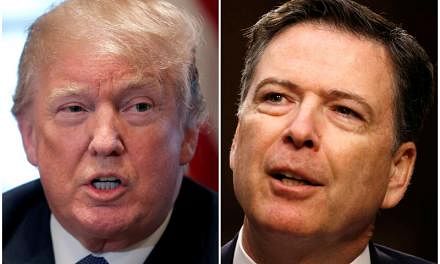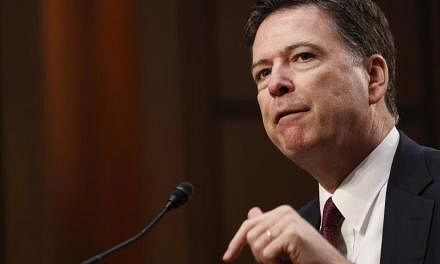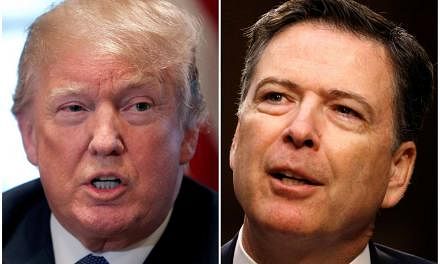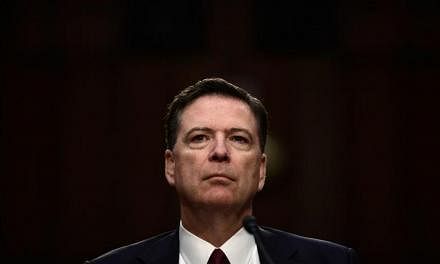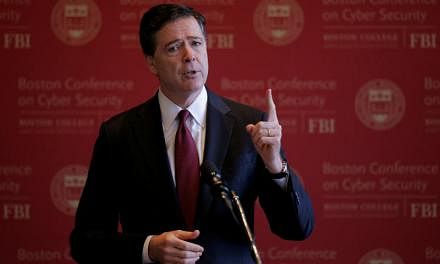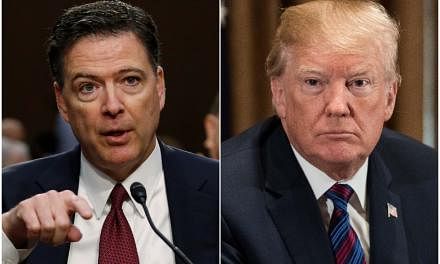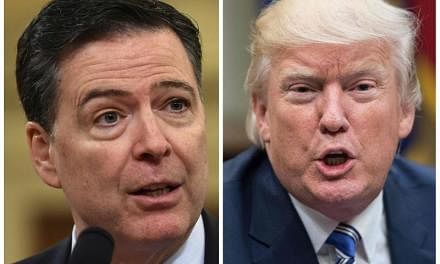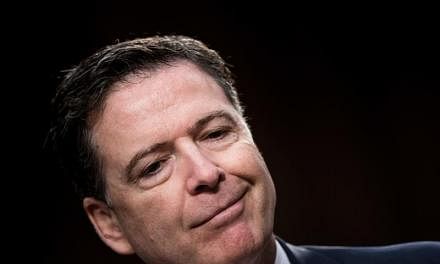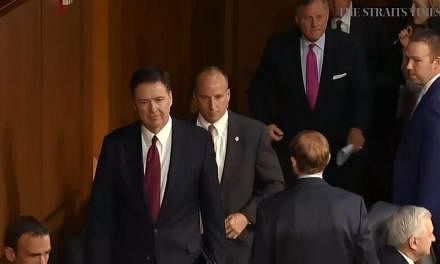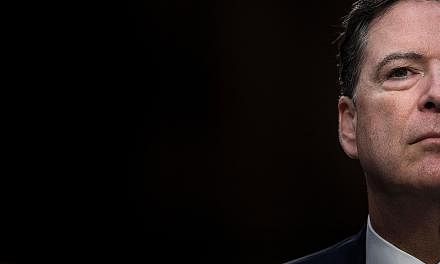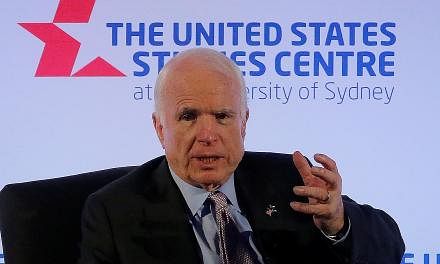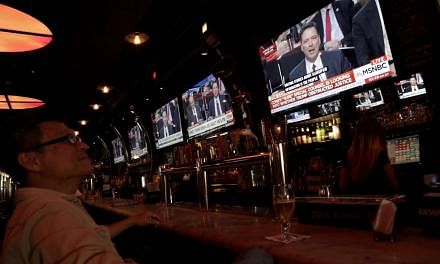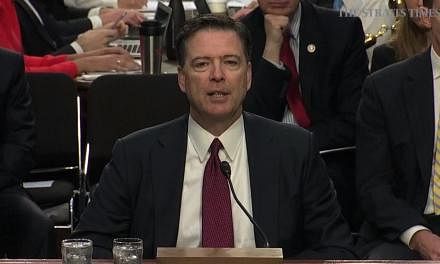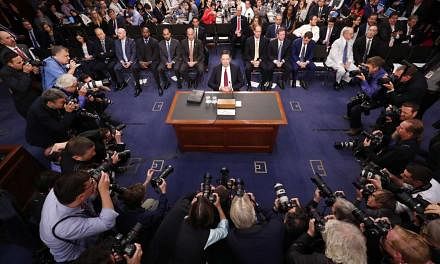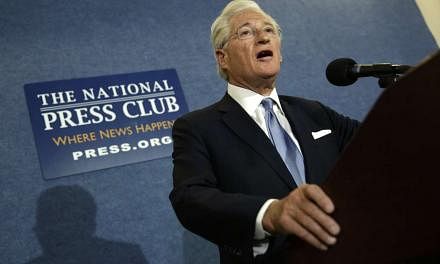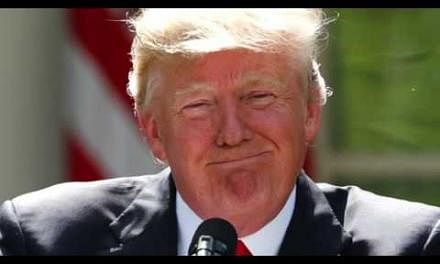Former FBI director James Comey's new book, "A Higher Loyalty: Truth, Lies and Leadership", has already turned into a best-seller even before its official release next Tuesday (April 17).
Pre-order numbers for the book - which details his private interactions with United States President Donald Trump - last month sent the 304-page memoir to the No. 1 spot on Amazon's list of best sellers.
Mr Comey's dismissal led to the appointment of Special Counsel Robert Mueller to investigate allegations that Russia meddled in the 2016 presidential election which swept Mr Trump to victory.
Here are some of the key revelations based on excerpts leaked by US media on Thursday (April 13).
1) Mr Trump asked Mr Comey to help debunk lewd allegations made in the infamous Trump- Russia dossier
Mr Comey described two January 2017 conversations with Mr Trump in which the President sought his help to knock down an unverified report alleging that Mr Trump had been caught on video with hired prostitutes and had watched them urinate on each other on a bed in a Moscow hotel room years in 2013.
The allegations had been contained in a document compiled by a former British intelligence officer.
Mr Trump said the story was untrue and was distressing to his wife Melania. He also insisted that "there's no way I would let people pee on each other around me" in part because he is a self-professed germophobe. Mr Trump, he said, "strongly denied the allegations, asking - rhetorically, I assumed - whether he seemed like a guy who needed the service of prostitutes. He then began discussing cases where women had accused him of sexual assault, a subject I had not raised." Mr Comey said the conversation went on until he finally said: "We are not investigating you, sir.' That seemed to quiet him."
2) Meetings with Mr Trump reminded Mr Comey of his work against the mob
Mr Comey, a veteran law enforcement agent, writes unsparingly about Mr Trump, calling him a tempestuous president whose connection to honesty was tenuous at best. He said his service to Mr Trump recalled for him the days when he investigated the mob in New York as a prosecutor, describing it at length. "The silent circle of assent. The boss in complete control. The loyalty oaths. The us-versus-them worldview. The lying about all things, large and small, in service to some code of loyalty that put the organisation above morality and above the truth," he wrote.
3) Mr Comey offers searing criticism of the "forest fire" that is Mr Trump's presidency
The book paints a devastating portrait of a president who built "a cocoon of alternative reality that he was busily wrapping around all of us," Mr Comey said.
"We are experiencing a dangerous time in our country," he wrote, "with a political environment where basic facts are disputed, fundamental truth is questioned, lying is normalised and unethical behaviour is ignored, excused or rewarded."
He also describes Mr Trump's presidency as a "forest fire." "What is happening now is not normal," he writes. "It is not fake news. It is not OK."
4) Mr Comey again describes the time Mr Trump asked him to drop the Flynn investigation
Mr Comey describes a February 2017, meeting in the Oval Office where Mr Trump asked Attorney General Jeff Sessions to clear the room so he could bring up the FBI investigation of former national security adviser Michael Flynn directly with Mr Comey.
Mr Flynn pleaded guilty to lying to the FBI last year over his contacts with Russia.
"I hope you can see your way clear to letting this go, to letting Flynn go," Mr Trump said, according to Mr Comey's account of the meeting, some of which he first shared in Senate testimony last year. "He is a good guy. I hope you can let this go." Mr Comey wrote that he regretted not interrupting Mr Trump to explain that his plea was wrong.
5) Mr Comey defends his handling of the Clinton email investigation
Mr Comey was denounced by many Democrats for announcing less than two weeks before the 2016 election that the FBI was examining a new trove of emails belonging to Mr Trump's rival Hillary Clinton - a move many Democrats blamed for Mr Trump's victory. Mrs Clinton had been under probe for compromising classified information by using a private email system.
In the last days of the campaign, however, Mr Comey said the FBI maintained that Mrs Clinton should not face criminal charges over the emails.
In his defence, Mr Comey acknowledged that he thought Mrs Clinton would win the presidency, adding that he was concerned that if he concealed the renewed investigation, it would make her an "illegitimate president."
6) Former President Barack Obama offered him kind words after the Clinton email probe fallout
Mr Comey detailed for the first time a private assurance he received from Mr Obama following the fallout of the Clinton email saga in the wake of Mrs Clinton's defeat.
Mr Comey wrote that Mr Obama sat alone with him in the Oval Office in late November 2016 and told him: "I picked you to be FBI director because of your integrity and your ability. I want you to know that nothing - nothing - has happened in the last year to change my view."
On the verge of tears, Mr Comey told Obama, "Boy, were those words I needed to hear. . . . I'm just trying to do the right thing."
7) Mr Comey reveals that Trump's chief of staff John Kelly offered to quit after learning he was fired in May 2017
Mr Comey said after his firing, he received "an emotional call" from Mr Kelly, who was then the secretary of homeland security. During the call, Mr Kelly said he was "sick" about the firing and intended to quit in protest. "I urged Kelly not to do that, arguing that the country needed principled people around this president. Especially this president," Mr Comey wrote.
8) Mr Comey took a dim view of his time working with former President George W. Bush's advisors
Mr Comey was United States Deputy Attorney General from 2003-2005 under Mr Bush. He offered less-than-flattering portraits of Mr Bush's political and diplomatic advisers, including Secretary of State Condoleezza Rice and Mr David Addington, a top adviser to Vice-President Dick Cheney. From their point of view, he says, "The war on terrorism justified stretching, if not breaking, the written law."
SOURCES: NYTIMES, WASHINGTON POST, BLOOMBERG

